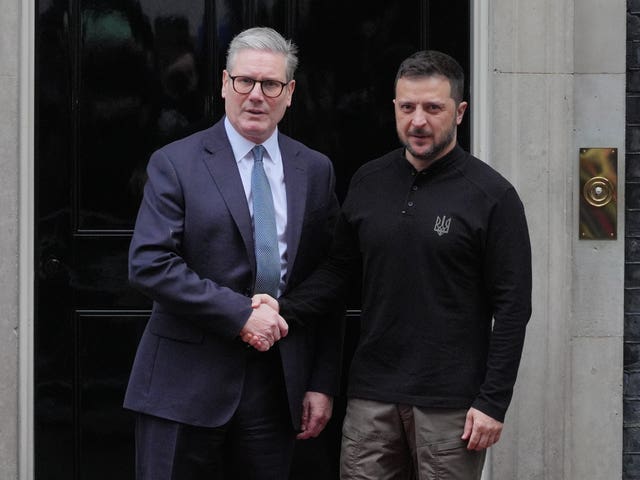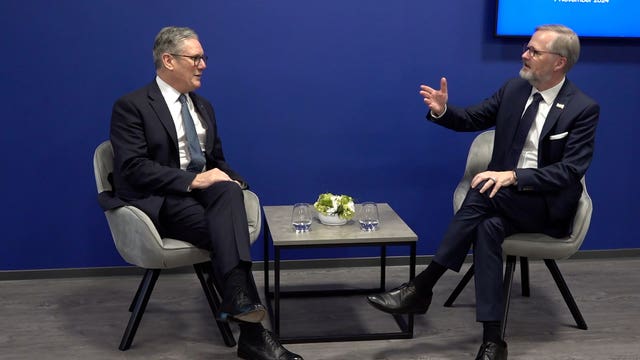Starmer says allies must ‘step up’ Ukraine support in meeting with Zelensky
The Prime Minister told the Ukrainian president the UK had an ‘unwavering’ commitment to help the country.

Sir Keir Starmer said allies must “step up” support for Ukraine, as he met the country’s president amid uncertainty about the future of US backing for Kyiv after Donald Trump’s election victory.
The Prime Minister told Volodymyr Zelensky the UK had an “unwavering” commitment to help the country defend itself against Russia’s invasion during bilateral talks at a European Political Community summit in Hungary.
Sir Keir also said the deployment of North Korean troops to Russia was “proof of Putin’s increasing desperation” and that the UK would stand with Ukraine “for as long as it takes for Russia to withdraw”.
The gathering of European leaders on Thursday was largely overshadowed by Mr Trump’s historic win at the US polls which puts him on course for a second term in the White House.
But figures including Sir Keir used the summit to insist international partners “see this through” and strengthen their resolve to offer continued support for Ukraine.
There will be concerns across some western capitals that the American election result may leave the country imperilled following the Republican politician’s refusal to explicitly back a victory for Kyiv.
He has said he wants to end the war “within a day” but declined to set out the specifics of how this would be achieved, with some interpreting this to mean a peace on terms favourable to Moscow.
Meeting Mr Zelensky one-to-one on the fringes of the event in Budapest, Sir Keir said: “As you know, our support for Ukraine is unwavering.

“And I strongly believe that not only should it be unwavering, but we need to step up, and I was very pleased to be able to say that (today).
“It’s very important that we see this through. It’s very important that we stand with you.”
The Ukrainian leader replied: “We’re very thankful. We’re very proud that we have such bilateral relations between our nations.
“Thank you for sticking with us all through this tough period.”
Speaking after the meeting, Sir Keir said the broader point being made in Budapest was not just about the sovereignty of Ukraine, but about “our freedom, our democracy and our values”.
“And that’s why it was very important for me today to have that further conversation with President Zelensky and reiterate just how ironclad the UK’s support for Ukraine is,” he said.
A Downing Street spokesperson said: “The Prime Minister expressed his deep concern at the growing number of North Korean troops on the Ukrainian border.
“He said this was proof of Putin’s increasing desperation.
“He said the UK will continue to stand with Ukraine for as long as it takes for Russia to withdraw.”
Sir Keir also held bilateral meetings with the prime ministers of Poland and the Czech Republic as well as European Commission President Ursula von der Leyen on the sidelines of the Budapest summit.
Nato secretary general Mark Rutte said Mr Trump’s first term had stimulated Europe to spend more on defence but “we need to do more”.

He stressed that the threat of Russia and its alliance with North Korea, China and Iran, posed problems to the US as well as Europe.
“If Russia would be successful in Ukraine, you would have an emboldened Russia at our border, having gained land mass, having gained the huge defence force of Ukraine, but also the ingenuity of the Ukrainian people,” he said in Budapest.
“So that will be a threat not only to the European part of Nato, but also to the United States.
“And that’s why, collectively, we have to work not only on the threat of Russia, but also the fact that these four countries work together, and that now, very soon, we will see that also the US itself is under threat from these newest technological developments thanks to Russia giving its latest insights and technology to the North Koreans.”
Around 50 European countries were reassessing their transatlantic relations at the summit in the hope that Mr Trump’s second US presidency will avoid the strife of his first administration.
European allies in Nato have congratulated the Republican politician on his election win and hope to convince him that if he helps to negotiate any peace, it should be done from a position of strength, for both Ukraine and the US.
Mr Rutte, who was Dutch prime minister during Mr Trump’s first 2017-2021 presidency, said: “I worked with him very well for four years.
“He is extremely clear about what he wants. He understands that you have to deal with each other to come to joint positions. And I think we can do that.”
Hungarian Prime Minister Viktor Orban, the summit’s host and a staunch Trump supporter, said he had already had a phone call with the incoming president overnight and that “we have big plans for the future”.
So did Italian Prime Minister Giorgia Meloni, who lauded the “deep and historic strategic partnership that has always tied Rome and Washington”.





